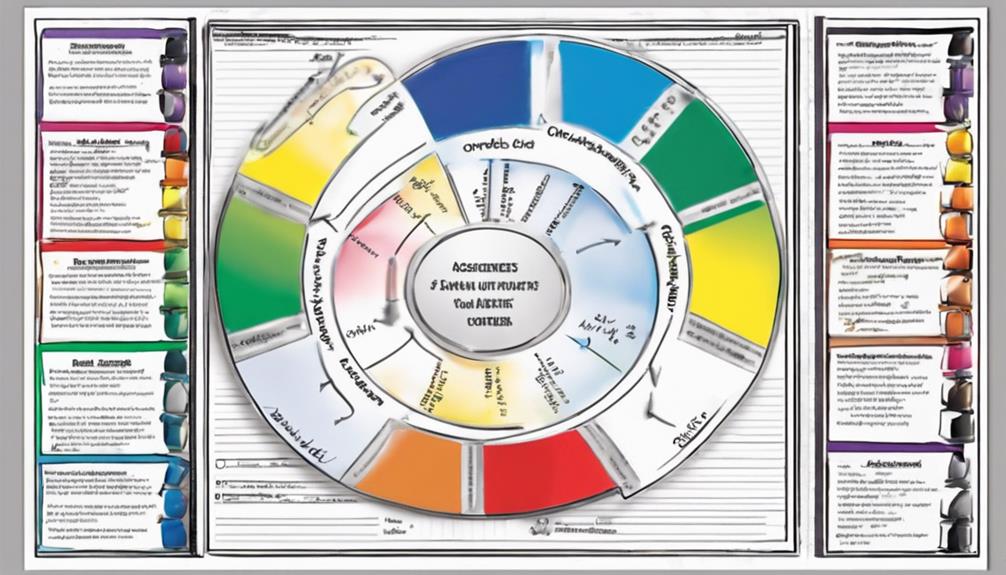As a team, it is crucial that we investigate the reliability of the DISC assessment like solving a complex puzzle. The apparent simplicity of the assessment can sometimes hide a more significant problem – its lack of scientific foundation.
However, this is just the tip of the iceberg when it comes to why this assessment warrants scrutiny. The potential ramifications of relying on it extend far beyond mere accuracy and touch upon fundamental principles of fairness and human interaction within organizations.
Let's explore why the DISC assessment's flaws go beyond what meets the eye.
Key Takeaways
- Lack of empirical evidence undermines DISC validity.
- Predictive limitations hinder informed decision-making.
- Potential for harmful labeling and stereotyping.
- Fairness and human interaction at risk in organizational settings.
Lack of Scientific Validity
In light of the lack of scientific validity underpinning assessments like the DISC and MBTI, it's imperative to critically evaluate their foundations and methodologies.
The DISC assessment, developed by an American psychologist, lacks empirical evidence to support its claims about categorizing individuals into four distinct personality styles. This raises concerns about the reliability and validity of the DISC style, as it fails to encompass key aspects of personality such as neuroticism. The roots of the DISC assessment in theories by Freud and Jung, which have been discredited in modern psychology, further diminish its scientific credibility. The inconsistent results obtained by individuals taking the DISC test highlight its questionable accuracy and reliability.
Moreover, the over-reliance on such pseudoscientific personality assessments like the DISC can have detrimental effects on organizational decision-making processes. Without a solid scientific foundation, the DISC assessment may hinder diversity and inclusion efforts by perpetuating inaccurate stereotypes and limiting individuals to rigid personality categories. As critical evaluators of psychological methodologies, it's essential to recognize the shortcomings of assessments like the DISC in order to make informed and evidence-based decisions.
Limited Predictive Power

DISC assessments' limited predictive power in determining job performance has raised significant concerns among researchers and professionals in the field. Studies have revealed that these assessments lack the ability to accurately forecast success in various roles, casting doubt on their efficacy in making informed hiring decisions. The oversimplification of complex human behavior and interactions by DISC assessments further diminishes their utility in predicting job performance. Employers should exercise caution when relying solely on DISC assessments to inform crucial organizational decisions.
| Criticisms of DISC Assessments |
|---|
| Lack of predictive power in job performance |
| Inability to forecast success in diverse roles |
| Oversimplification of human behavior |
| Caution needed in organizational decisions |
The evidence suggests that the limited predictive power of DISC assessments undermines their effectiveness in assessing job performance and making informed organizational decisions. As professionals in the field, it is imperative to critically evaluate the validity and utility of tools like DISC assessments to ensure that decisions are based on robust and reliable data rather than oversimplified models of human behavior.
Potential for Harmful Labeling
Leveraging personality assessments without proper consideration can lead to harmful labeling practices that risk pigeonholing individuals and hindering their personal and professional growth. The use of assessments like DISC can result in harmful stereotypes and biases, as individuals may be unfairly categorized into restrictive personality types. These labels have the potential to influence how others perceive and treat individuals, potentially leading to unfair treatment based on these predetermined categories.
Furthermore, focusing too much on these labels can overshadow the complexities and unique qualities that make each individual different and valuable. Within a team setting, reliance on these labels from assessments can create division and misunderstandings, hindering collaboration and productivity. It's crucial to approach personality assessments with caution, recognizing the limitations and potential harm that can arise from labeling individuals based on these assessments.
Frequently Asked Questions
What Are the Criticisms of the DISC Assessment?
We find criticisms of the DISC assessment in its lack of scientific rigor, reliance on pseudoscience, and oversimplified classifications. This tool's limitations risk hindering personal growth by attributing behavior solely to fixed personality types, neglecting environmental influences.
What Are the Disadvantages of the Disc Test?
The DiSC test lacks scientific validity, leading to inconsistent and unreliable outcomes. Its labels can fuel biases and stigmatization in team dynamics. Despite its flaws, the industry thrives, potentially causing organizations to make inaccurate judgments in hiring and team decisions.
Is DISC Assessment Scientifically Valid?
Yes, the DISC assessment lacks scientific validity. It fails to consider key psychological aspects like neuroticism, leading to inconsistent and unreliable results. Stigmatization based on results can skew team dynamics, highlighting the need for a more robust evaluation tool.
What Are the Negative Traits of Disc?
When considering the negative traits of DISC, one may find its lack of scientific validity troubling. The overreliance on DISC in team dynamics can lead to bias and unfair judgments. Its limited predictive power raises concerns.
Conclusion
In conclusion, the DISC assessment is like a mirage in the desert, promising insight but ultimately leading us astray. Its lack of scientific validity, limited predictive power, and potential for harmful labeling make it a shaky foundation for any organizational decisions.
Let's tread cautiously and seek more reliable tools to navigate the complex terrain of human behavior in the workplace.









